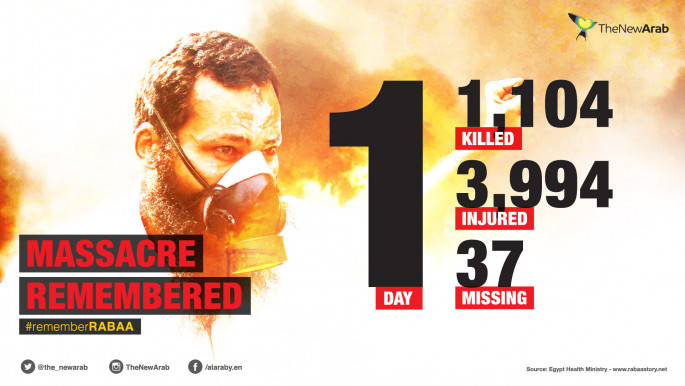'Compensate victims of Rabaa massacre' rights group urges Egypt
"Egypt's parliament should pass a transitional justice law establishing a new, impartial investigation into the mass killings of protesters in 2013 that will lead to accountability and fair compensation for victims' families," the rights watchdog said in a statement on Sunday.
"Compensation for the mass killings of 2013, though far from a complete solution, is an essential part of an effective remedy for a gross human rights violation under international law."
Egypt is party to multiple treaties that guarantee the right of victims to an effective remedy before an independent and impartial authority, the statement added.
The treaties include the International Covenant on Civil and Political Rights, which requires fair and adequate compensation, an investigation that determines the facts, and prosecution of those responsible.
The statement marked the third anniversary of the bloody crackdown that left at least 800 pro-democracy demonstrators dead after security forces opened fire to disperse large crowds taking part in sit-ins at Cairo's Rabaa al-Adaweya and al-Nahda squares.
 |
Compensation for the mass killings of 2013, though far from a complete solution, is an essential part of an effective remedy for a gross human rights violation under international law - HRW |
 |
The demonstrators had been protesting the removal of President Mohamed Morsi on July 3, 2013 in a military coup led by current President Abdel Fattah al-Sisi, who was the defence minister at the time.
"If President Abdel Fattah al-Sisi's government hopes to have any credibility with the thousands of Egyptians who have suffered over the past three years, it should ensure a serious accounting for these grave crimes," said Sarah Leah Whitson, Middle East and North Africa director at Human Rights Watch.
"The mass killings of August 14, 2013, remain a dark stain on Egypt's record that no amount of spin from the government or its allies will ever wash away."
Hundreds, more than a thousand by some counts, were killed that day in what human rights organisations have since declared massacres and crimes against humanity.
Since the deadly event, Cairo's ongoing crackdown has seen hundreds of anti-regime activists detained and many more missing.
Reports issued by human rights organisations including Amnesty International, Human Rights Monitor, al-Nadeem and al-Karama have put the numbers of missing persons – not dead or injured, just "disappeared" – at anywhere between 200 and 500.
On Sunday, the deputy spokesperson for the UN secretary general called for an investigation into the bloody crackdown.
Farhan Haq said that the UN chief "believes it is very important to conduct a full investigation on the killing of hundreds of civilians, and to respect the right to peaceful protest and freedom of assembly during demonstrations planned by opponents of the current regime organised on the third anniversary of the sit-in".
| Read also: In memory of Rabaa: A national tragedy |
 |
| [Click to enlarge] |
Despite international condemnations and the Egyptian authorities' failure to seriously investigate the mass killings, HRW said, neither the United Nations Human Rights Council nor the African Commission on Human and Peoples' Rights have established international commissions of inquiry.
Thus, the rights watchdog reiterated its call on both organisations to establish such commissions, which it described as "one of the last resorts for victims".
"The international community has abandoned any pretence that justice for the victims of August 2013 will stand in the way of business as usual," Whitson said.
"If Egypt's lawmakers want to represent all Egyptians, they should prove it by seeking basic accountability for the crimes committed by Egyptian security forces."
#RememberRabaa: Watch our special video coverage here and join the conversation by tweeting us @The_NewArab:
![Rabaa anniversary [AFP] Rabaa anniversary [AFP]](/sites/default/files/styles/image_345x195/public/media/images/AA14A1C5-7F4C-4132-A446-9F71748FFD8D.jpg?h=d1cb525d&itok=pciAdmpz)




 Follow the Middle East's top stories in English at The New Arab on Google News
Follow the Middle East's top stories in English at The New Arab on Google News


